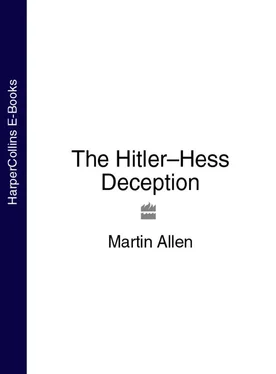Over the next four years Haushofer’s importance to Hess and Hitler continued to rise. His was often the hidden voice of reason that attempted to put a tone of mollification into Nazi foreign policy, his often the role of modest intermediary between the Führer and certain top Britons.
1935 was to be the high point of Hitler’s England-Politik , complete with the signing of the Anglo–German Naval Agreement, whereby Germany was permitted to expand its fleet beyond the constraints of the treaty of Versailles. In achieving this, Hitler made the catastrophic error of believing that the British government could be wooed into permitting an expanded Greater Germany, that they would calmly stand back whilst he carved out an enormous new empire for Germany in the east.
In 1937, two years after Anthony Eden and Sir John Simon’s visit to Berlin, Haushofer’s connections and talent for mediation meant that he was still very much in the fore of German diplomacy, particularly when Lord Halifax visited Germany and it was arranged for him to meet Hitler. The two politicians, eyeing each other warily, discussed the central European situation with regard to the Nazis’ increasing calls for unification of all ethnic German peoples – as defined by Albrecht’s father, Karl Haushofer. The meeting was unreservedly deemed a success, and during his train journey home, Halifax would note: ‘Unless I am wholly deceived, the Germans, speaking generally, from Hitler to the man in the street, do want friendly relations with Great Britain. There are no doubt many who don’t: and the leading men may be deliberately throwing dust in our eyes. But I don’t think so …’ 34
In 1940 and 1941 Hitler would think back on his meeting with Lord Halifax, and remember that this eminent British politician, a leading member of the Conservative Party, had spoken earnestly of his desire to see a lasting European peace. Indeed, their discussions had seemed so propitious that Hitler had ‘talked of the possibility of disarmament’, beginning with ‘the possible abolition of bombing aeroplanes’. Halifax had later told the British Cabinet that he believed Germany would continue working towards ethnic unity, and that ‘the basis of an understanding might not be too difficult as regards to Central and Eastern Europe’ 35– which would have been music to Hitler’s ears. Following their meeting the German Führer had thought well of Lord Halifax, seeing him as a voice of reason in Britain, particularly after the declaration of war in September 1939. However, his opinion of this eminent man of British politics would later change radically. Feeling deceived and let down by fickle British politicians, he would comment bitterly, ‘I regard Halifax as a hypocrite of the worst type, as a liar.’ 36
Albrecht Haushofer’s pre-war influence was perhaps most strongly felt during the Munich Crisis of 1938, when he acted on behalf of the VDA in the Sudetenland advising the German delegation during the negotiations that would see Czechoslovakia stripped of her western territories. One of the keys to explaining Haushofer’s participation in high-level German foreign affairs is that Hitler believed Germany’s Foreign Ministry to be a slow, plodding beast, run by old-fashioned diplomats who took forever to negotiate a deal with any foreign nation. He therefore encouraged the use of alternative diplomatic means in the form of his own Nazi Party foreign-political machinery, the Aussenpolitisches Amt, the VDA and the Dienststelle Ribbentrop, all of which were run by men whose primary loyalty was to the Führer himself, men Hitler knew he could trust to give him what he wanted. This group included Albrecht Haushofer. In 1936 Haushofer and a diplomat named Graf Trauttmansdorf were sent to Czechoslovakia on Hitler’s secret orders for private talks about the Sudetenland. However, ‘they were forbidden to have any contact with the German diplomatic mission in Czechoslovakia, and the then German Foreign Minister, von Neurath’. 37
The end of the 1930s saw the pressure-cooker of European politico-diplomatic tensions rise inexorably towards bursting point as the Nazis strained to expand Germany beyond her frontiers, to absorb every part of Europe containing ethnic Germans, as outlined by Karl Haushofer in the 1920s (see maps, pp. 16, 23). This objective closely followed Professor Haushofer’s theories, and like his son he was very active throughout the 1930s, contacting Ukrainian nationalists and working extensively with the Ukrainian Hetman Organisation, which supported the freeing of the Ukraine from Soviet domination. All of this would come together in June 1941, for Hitler would not attack the Soviet Union merely out of political ideology, but because western Russia played a critical role in the Nazis’ plans for their future Reich. The Nazis intended that the Ukraine would become the Reich’s breadbasket, while the Caucasus became her source of oil. Karl Haushofer was very important to this plan, and within his theories, his extensive range of contacts and his knowledge of the region lay the key, the Nazis hoped, to the Reich’s future success.
When Rudolf and Ilse Hess’s son, Wolf Rüdiger, was born in 1938, one of the child’s godfathers was Adolf Hitler; the other was Albrecht Haushofer. It may seem extraordinary that the co-signer of the infamous Nuremberg Laws (which removed German Jews’ political and social rights) chose the part-Jewish Albrecht Haushofer as his child’s godfather, despite the fact that he, Hitler, and all the top Nazis knew full well the Haushofer family’s Jewish connections. Indeed, at the christening party held at Hess’s Munich home in the affluent suburb of Harlaching, guest of honour Adolf Hitler mingled freely and happily with his and Hess’s friends, chatting gaily to his long-time acquaintance Martha Haushofer, who was half-Jewish.
1938 was a time of great change. The zenith of Nazi foreign policy successes was passing, and the Hess christening party was marred towards the end by a disagreement between Karl Haushofer and Hitler. The by-now elderly Professor Haushofer, who had become used to being regarded as the Nazis’ geopolitical guru, sought out for his wise counsel, now sensed that he too was passing his zenith. Hitler, like some Frankenstein’s monster of his own creation, was showing increasing signs that he intended to pursue Nazi foreign policy in an aggressive manner that the old Professor felt increasingly at odds with, and which he felt might well lead to war. Needless to say, when he voiced his opinion to Hitler, it was not well received.
Hitler should have listened to his old friend, for there would soon be signs that Germany’s European neighbours would no longer stand back and turn a blind eye to the Nazis’ expansionist agenda.
Following the autumn 1938 Munich Conference to settle the Sudeten Question, which was to strip Czechoslovakia of her western territories and leave her open to German conquest a mere six months later, certain high-ranking British civil servants and politicians regretfully concluded that Poland was likely to be next on Hitler’s agenda. He would demand the return of Danzig and the Corridor – the last remaining major strip of territory taken from Germany in 1919. However, what Hitler did next shocked everyone. Rather than sticking to Karl Haushofer’s plan for expanding Germany to encompass all ethnic Germans (which the British Foreign Office was well aware of), the German Führer swallowed up the rest of Czechoslovakia as well, in direct contravention of the agreement he had signed with Britain’s Prime Minister Neville Chamberlain in Munich the previous year.
Czechoslovakia proper had never been part of Germany, and there were few, if any, ethnic Germans living there. Yet Hitler had simply marched in and taken a foreign nation over. This raised the frightening prospect that no one was safe, if not from direct invasion, then from belligerent German aggression to protect their interests – and who could say where the Nazis might judge those to be?
Читать дальше












